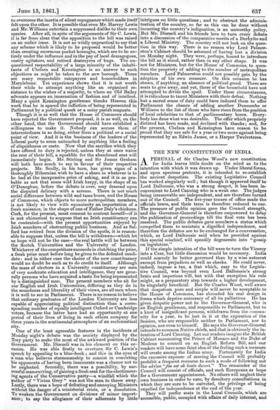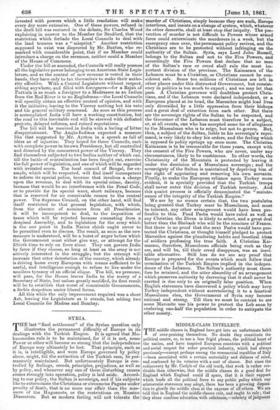THE NEW CONSTITUTION OF INDIA.
14i PERUSAL of Sir Charles Wood's new constitution for India leaves little doubt on the mind as to the intention with which it was drawn up. Under liberal forms, and upon specious pretexts, it is intended to re-establish the ancient despotism. The existing Legislative Council has worked singularly well ; but though it approved itself to Lord Dalhousie, who was a strong despot, it has been in- convenient to Lord Canning who is a weak one. The judges being irremovable are independent, and are therefore turned out of the Council. The five-year tenure of office made the officials brave, and their term is therefore reduced to one. The pressure of public opinion gave the Council strength, and the Governor-General is therefore empowered to delay the publication of proceedings till the final vote has been received. The public debates gave members a status which compelled them to maintain a dignified independence, and therefore the debates are to be exchanged for a conversation, which, as Lord Dalhousie said when he provided against this special mischief, will speedily degenerate into "gossip on legislation." If the simple intention of the bill were to turn the Viceroy into a Czar, but little discussion would be necessary. India could scarcely be better governed than by a wise autocrat exempt from prejudices as well as checks. He could never, indeed, impose a tax, a feat which, easy to the Legisla- tive Council, was beyond even Lord Dalhousie's strong brain and imperious will, but with that exception his rule might, as a preparatory step towards a higher development, be singularly beneficial. But Sir Charles Wood, well aware that despotism pure and simple will never be acceptable to the House of Commons, has shrouded his real design in forms which deprive autocracy of all its palliatives. He has given despotic power not to the Governor-General, who is an English gentleman, and responsible to Parliament, but to a knot of insignificant persons, withdrawn from the commu- nity for a year, to be lost in it at the expiration of the Session, who are responsible neither to Parliament, nor to opinion, nor even to himself. He says the Governor-General intends to summon Native chiefs, and that is obviously the in- tention of Lord Canning. Let our readers imagine the British Cabinet summoning the Prince of Monaco and the Duke of Modena to council on an English Reform Bill, and our readers will have some faint idea of the feeling such a measure will create among the Indian army. Fortunately for India the excessive expense of moving the Council will probably prohibit a frequent recourse to such a mode of following out the advice "fas est ab hosts doceri." The remainder of the Council will consist of officials, and such Europeans as hope for a Government appointment. No others will neglect their own business in order to earn, by desultory consultations in which they are sure to be outvoted, the privilege of being expelled for independence at the end of the year. They will prefer seats in the Local Councils, which are accessible, public, occupied with affairs of daily interest, and invested with powers which a little resolution will make every day more extensive. One of these powers, refused in the draft bill was restored in the debate, Sir Charles Wood explaining in answer to the Member for Bradford, that the restriction which forbade the Local Councils to deal with the land tenures was a " misprint." Another restriction supposed to exist was disproved by Mr. Buxton, who re- marked with considerable point, that if no Member could introduce a charge on the revenues, neither could a Member of the House of Commons.
Under the bill as amended, the Councils will really possess all the legislative power belonging to an American State Legis- lature, and as the control of new revenue is vested in their hands, they have only to tax themselves to make their autho- rity effective. With a Central Legislature without respect, sitting anywhere, and filled with foreigners—for a Rajah of Puttiala is as much a foreigner to a Madrassee as an Indian from the Red River is to an Englishman—the Local Councils will speedily obtain an effective control of opinion, and with it the initiative, leaving to the Viceroy nothing but his veto and his general military command. As soon as this process is accomplished India will have a working constitution, but the road to this inevitable end will be strewed with defeated projects, delayed reforms, and ruined reputations. The bill will be received in India with a feeling of bitter disappointment. The Anglo-Indians expected a measure like that suggested by Mr. Ayrton in a speech as full of ideas as of injustice. They hoped for three Councils, each with complete power in its own Presidency, but all controlled and directed by the concurrent power of the Viceroy. They End themselves subjected to two bodies neither of which can, till the battle of centralization has been fought out, exercise the full power of legislation, and one of which will be regarded with irritated scorn. The local council of Bengal, for ex- ample, which will be respected, will find itself incompetent to reform its special police, because that involves a charge upon the revenue, to deal with its special crime, dacoity, because that would be an interference with the Penal Code, or to provide for its special want, short railways, because that is reserved for no conceivable reason to the central power. The Supreme Council, on the other hand, will find itself restricted to that general legislation, with which, from the absence of nominees from all Presidencies, it will be incompetent to deal, to the imposition of taxes which will be rejected because emanating from a despised Assembly, and to legislation for the army which is the one point in India Native chiefs ought never to be permitted even to discuss. The result, as soon as the new measure is understood, will be a burst of anger before which the Government must either give way, or attempt for the fiftieth time to rely on force alone. They can govern India by force if they choose, so long at least as the army is not actively interested in the struggle ; but the attempt will increase that utter detestation of the country, which already is driving home every European with means sufficient to be useful, and intelligence enough to refuse to live under the needless tyranny of an official clique. The bill, we presume, will pass, for the House leaves India to the mercy of a Secretary of State, but unless greatly modified, its first result will be to establish that worst of conceivable Governments, a feeble despotism under liberal forms.
All this while the only improvement required was a short Act, leaving the Legislature as it stands, but adding two Local Councils for Madras and Bombay.































 Previous page
Previous page